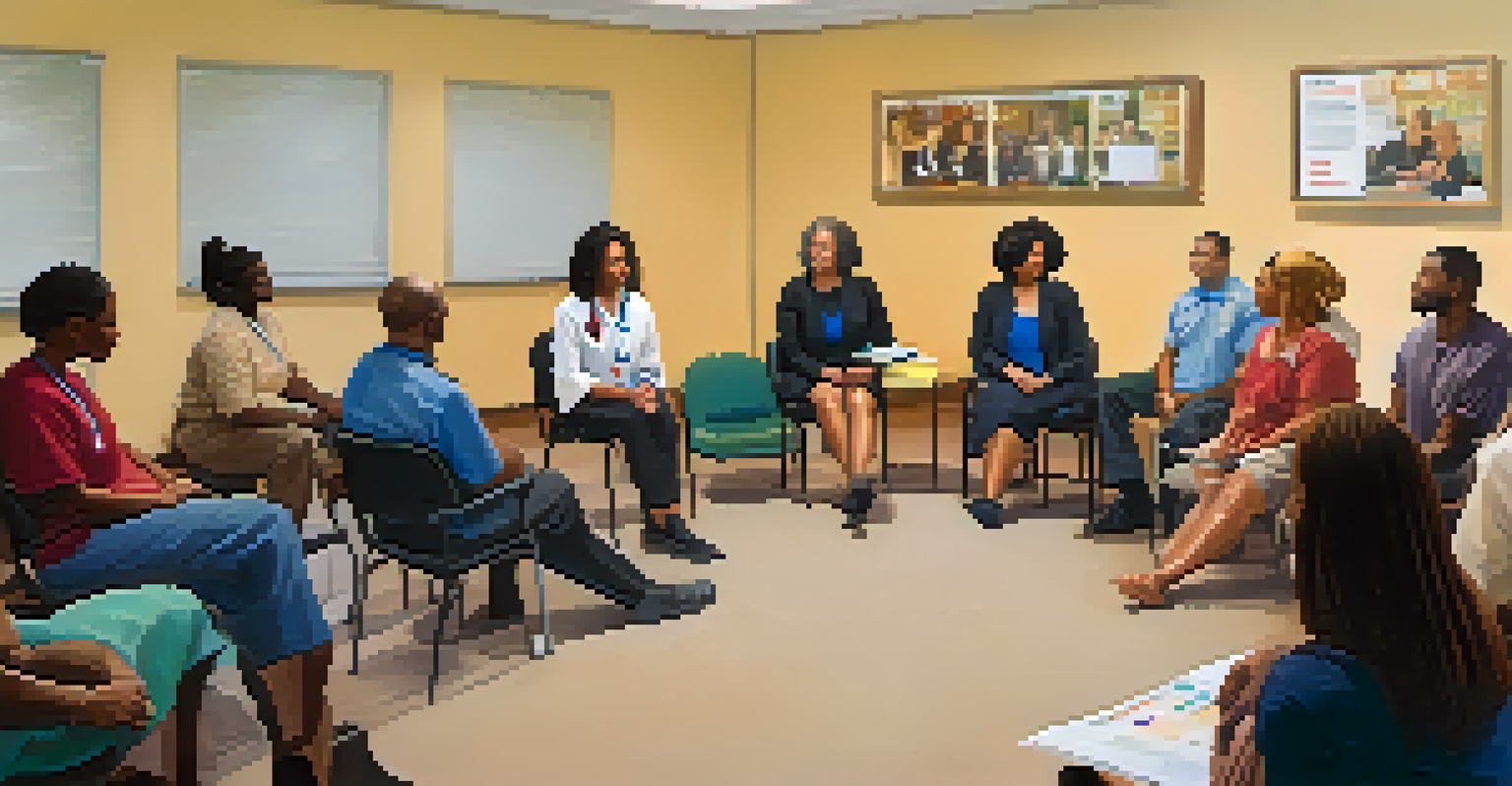The Role of Faith-Based Organizations in Health Equity Access

Understanding Health Equity and Its Importance
Health equity refers to the principle of ensuring that everyone has a fair and just opportunity to be as healthy as possible. It means addressing the disparities that exist due to social, economic, and environmental factors. Just like a race where everyone should have the same starting point, health equity aims to level the field for all individuals, especially marginalized communities.
Health equity means more than just access to healthcare. It means ensuring that everyone has the opportunity to thrive, regardless of their background or circumstances.
This concept is crucial because good health is a cornerstone of a thriving society; without it, individuals struggle to reach their full potential. For instance, consider how children from disadvantaged backgrounds often face barriers to accessing quality healthcare, affecting their academic and life outcomes. Thus, promoting health equity is not just a health issue but a societal one.
Faith-based organizations (FBOs) have a unique role to play in this landscape. They often operate at the community level, where they can identify and address local health disparities, making them essential allies in the fight for health equity.
The Unique Position of Faith-Based Organizations
Faith-based organizations typically have deep roots in their communities, providing them with a unique perspective on the needs and challenges faced by residents. Their established trust and relationships allow them to effectively engage with individuals who may feel alienated from traditional healthcare systems. Think of FBOs as community anchors; they can provide not just health services but also a supportive network for those in need.

Moreover, these organizations often have access to resources that can enhance health services, such as volunteers, funding, and facilities. Many FBOs operate clinics, provide health screenings, or offer wellness programs that are tailored to the specific needs of their community. This ability to adapt services to local contexts is a significant advantage in promoting health equity.
Health Equity's Community Impact
Promoting health equity is essential for ensuring that marginalized communities can access the healthcare they need to thrive.
In addition, FBOs can leverage their platforms to raise awareness about health issues, advocate for policy changes, and build coalitions that push for greater health access. This multifaceted approach makes them key players in addressing health inequities.
Programs and Initiatives Focused on Health Equity
Many faith-based organizations have developed innovative programs aimed at improving health access among underserved populations. For example, some FBOs offer mobile health clinics that travel to areas with limited healthcare facilities, bringing services directly to those in need. This mobile approach helps eliminate transportation barriers that often prevent individuals from seeking care.
Faith-based organizations are essential in addressing health disparities and promoting health equity in our communities.
Additionally, FBOs frequently host health fairs, providing free screenings, vaccinations, and educational resources. These events not only deliver essential health services but also foster community engagement and awareness about health issues. Imagine a vibrant community gathering where people can learn about health while enjoying a day out—it’s a win-win!
Through tailored programs, FBOs can address specific health challenges, such as obesity, diabetes, and mental health, by offering workshops, support groups, and nutritional guidance. This targeted focus helps empower individuals to take charge of their health, promoting long-term well-being and equity.
Building Trust in Health Access
Trust is a crucial element when it comes to accessing healthcare, and faith-based organizations often serve as trusted intermediaries. Many individuals may hesitate to seek help from traditional healthcare providers due to past negative experiences or cultural differences. However, FBOs typically resonate with community values, making them more relatable and trustworthy.
This trust can lead to increased healthcare utilization, as individuals feel more comfortable seeking services from those they know and respect. For example, a church might host a health information session where congregants feel safe discussing their health concerns openly. By fostering this environment, FBOs can effectively bridge the gap between communities and healthcare providers.
FBOs as Trustworthy Resources
Faith-based organizations serve as trusted intermediaries, helping bridge the gap between healthcare providers and communities.
Moreover, FBOs often emphasize holistic approaches to health, considering not just the physical but also the spiritual and emotional well-being of individuals. This comprehensive view can enhance overall health outcomes and promote a sense of belonging and care within the community.
Advocacy and Policy Influence by FBOs
Faith-based organizations are not only service providers but also powerful advocates for health equity. They can influence policy decisions at local, state, and national levels, pushing for changes that promote better health access for underserved populations. By mobilizing their congregations and communities, FBOs can amplify their voices in the public sphere.
For instance, FBOs have been instrumental in advocating for healthcare reforms that address systemic barriers to access. They often work collaboratively with other organizations and coalitions, leveraging their collective power to effect change. Imagine a diverse group of organizations coming together, each bringing their unique strengths to fight for a common cause—this is the essence of effective advocacy.
Additionally, FBOs can raise awareness about health inequities, educating the public and policymakers about the needs of marginalized communities. Their moral and ethical perspectives can humanize data, reminding us that behind every statistic is a person deserving of care and respect.
Challenges Faced by Faith-Based Organizations
Despite their vital role, faith-based organizations face several challenges in promoting health equity. Limited funding and resources can hinder their ability to implement and sustain health initiatives. Many FBOs operate on tight budgets, often relying on donations and volunteer support, which can be unpredictable and insufficient for expansive programs.
Additionally, navigating the complexities of healthcare systems can be daunting for FBOs. They may lack the expertise or capacity to handle administrative tasks such as grant writing, compliance, and reporting. This can limit their impact, despite their strong community ties and genuine intentions.
Advocacy for Systemic Change
FBOs play a critical role in advocating for policy changes that address health disparities and promote equitable access to healthcare.
Moreover, some FBOs may struggle with addressing the diverse needs of their communities, particularly in areas with varying cultural backgrounds. Balancing faith-based principles with inclusive health practices requires sensitivity and adaptability, which can be challenging in practice.
The Future of Health Equity Through Faith-Based Organizations
Looking ahead, the potential for faith-based organizations to impact health equity is immense. As awareness around health disparities grows, FBOs can play a pivotal role in fostering collaborative partnerships with healthcare providers, policymakers, and community leaders. Together, they can work towards creating a more equitable healthcare landscape.
Moreover, the rise of technology offers new avenues for FBOs to expand their reach and effectiveness. Telehealth services, online health education, and social media campaigns can enhance their ability to engage with the community, especially among younger generations. Imagine a church using social media to promote health events and share vital information—this modern approach can significantly broaden their impact.

Ultimately, the commitment of faith-based organizations to serve their communities can lead to transformative changes in health equity. By continuing to adapt, collaborate, and advocate, FBOs can help ensure that everyone has access to the healthcare they deserve.